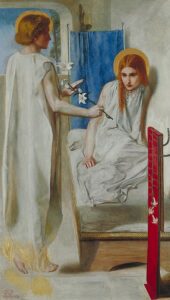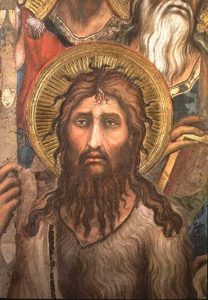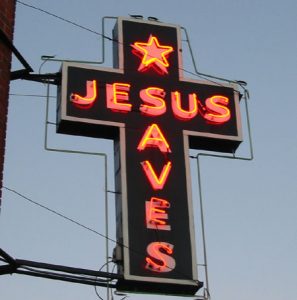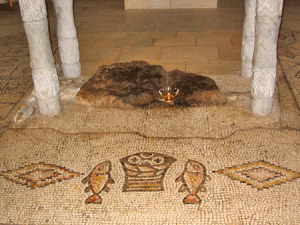====================
A sermon offered on the Last Sunday after Pentecost, Christ the King, (Proper 29B, Track 1, RCL), November 22, 2015, to the people of St. Paul’s Episcopal Church, Medina, Ohio, where Fr. Funston is rector.
(The lessons for the day are 2 Samuel 23:1-7; Psalm 132:1-19; Revelation 1:4b-8; and John 18:33-37. These lessons may be found at The Lectionary Page. The collect for the day, referenced in the sermon, is found at the same site.)
====================
 The kingdom of God, of which today we celebrate Christ as king, is not a kingdom of security; it is a kingdom of peace, dangerous peace.
The kingdom of God, of which today we celebrate Christ as king, is not a kingdom of security; it is a kingdom of peace, dangerous peace.
There is no way to peace along the way of safety. For peace must be dared, it is itself the great venture, and can never be safe. Peace is the opposite of security… To look for guarantees is to want to protect oneself. Peace means giving oneself completely to God’s commandment, wanting no security, but in faith and obedience laying down the destiny of the nations in the hand of Almighty God, not trying to direct it for selfish purposes. Battles are won, not with weapons, but with God. They are won when the way leads to the cross. (Dietrich Bonhoeffer, 1934, quoted in Bethge, Renate, Dietrich Bonhoeffer: A Brief Life)
In 1934 the young German pastor Dietrich Bonhoeffer watched in sadness as his democratic, educated, and Christian country discarded more and more of its core values. Fear-mongering politicians lured patriotic citizens to ignore their Bibles and the promise and hope of the Prince of Peace, and worship instead at the altar of safety and national security; he witnessed them behave terribly toward foreigners, minorities, the disabled and the mentally ill. Three weeks after Adolf Hitler was proclaimed Der Führer, Bonhoeffer preached the sermon I have just quoted.
Today, as the Christian year draws to a close, we celebrate the universal sovereignty of Christ. We call this last Sunday after Pentecost “Christ the King” and we underscore that Jesus is our Lord. My friend and colleague Kara Slade, who is completing her doctorate in systematic theology at Duke, posted as her Facebook status this morning:
Because Jesus is Lord, your fear is not.
Because Jesus is Lord, your bank account is not.
Because Jesus is Lord, your preferred political candidate is not.
Because Jesus is Lord, your theological platform (and mine) is not.
Because Jesus is Lord, every power and principality of this world is not.
Theologian Daniel Clendenin makes the same point when he writes, “The kingdom of God that Jesus announced and embodied is what life would be like on earth, here and now, if God were king and the rulers of this world were not. The political, economic, and social subversions would be almost endless — peace-making instead of war mongering, liberation not exploitation, sacrifice rather than subjugation, mercy not vengeance, care for the vulnerable instead of privileges for the powerful, generosity instead of greed, humility rather than hubris, embrace rather than exclusion.”
This morning we are joined by several young men and women, members of our own Episcopal Youth Community and of youth groups of other parishes, who erected cardboard shelters on our church’s front lawn, who spent the night as many homeless do in the cold and rain, and who walked the town square with volunteers from Operation H.O.M.E.S. to raise money for and call attention to the needs of the homeless in our community. Their witness extends beyond our community to the other cities where their other congregations are located, but also beyond our own diocese and state; they witness to plight of people of all ages made homeless by economics, made homeless by ill-health, made homeless by addictions, made homeless by war. They witness to hundreds of thousands in this country and beyond our borders who are refugees from their homes but who, like us, are “no longer strangers and aliens, but . . . citizens with the saints and also members of the household of God.” (Eph 2:19)
In worldly terms, Jesus’ kingship during his life was a pretty spectacular failure. He was born in a stable and soon (probably when he was about two years of age) became a refugee himself, living in a country not his own: “Get up,” said an angel to his father, “take the child and his mother, and flee to Egypt, and remain there until I tell you.” (Mt 2:13) He was rejected by most of his family and friends: “Prophets are not without honor except in their own country and in their own house,” he said. (Mt 13:57) He wandered as homeless person: “Foxes have holes, and birds of the air have nests; but the Son of Man has nowhere to lay his head,” he once remarked. (Mt 8:20) He died, as we heard in the Gospel account this morning, condemned as a political rebel. “Behold,” he says in the form of the Stations of the Cross we often use in this parish, “the poorest king who ever lived. Even my deathbed, this cross, is not my own.”
Yet within less than generation communities would form throughout the ancient Middle East dedicated to the idea that not only was he a king, but that he was and is the very Son of God. Within less than 60 years after his crucifixion, John of Patmos would declare that he is “the one who is and who was and who is to come.”
When we focus on Christ as our king, we celebrate and give thanks for this temporal three-dimensionality; when we give thanks for the universal sovereignty of Christ, who in the words of one of our Ascension hymns we name “the Lord of interstellar space and Conqueror of time,” we see these three tenses of Thanksgiving: the past, the present, and the future. The kingdom over which he is Lord and of which we are all a part always has been, is, and always will be. It is, preached Patrick of Ireland,
. . . greater than all report, better than all praise of it, more manifold than every conceivable glory. The Kingdom of God is so full of light, peace, charity, wisdom, glory, honesty, sweetness, loving-kindness and every unspeakable and unutterable good, that it can neither be described nor envisioned by the mind. . . . . In the eternal Kingdom there shall be life without death, truth without falsehood, and happiness without a shadow of unrest . . . (Sermon for Advent quoted in Ramshaw, Gail, Treasures Old and New: Images in the Lectionary)
On this Feast of Christ the King, in a few minutes, we will dedicate our financial commitments to our ministry in Christ’s church and our stewardship of Christ’s kingdom. The pledge cards we have completed and turned in are tokens of our gratitude, signs of our thanks for all “the unspeakable and unutterable good” that God has given us, sacramental of our commitment to care for it and use it to the benefit of others. Our thanksgiving is three-dimensional, evidencing our awareness of God’s abundance through the ages, our sense of his very presence in this moment, and our declaration of faith that God is also yet to come. When we live with that sense of expectation, today makes a difference; our pledges of gratitude and good stewardship make a difference.
When we celebrate Jesus as King, we reach back into the Jewish roots of our faith, into the Hebrew past. We hear King David, the shepherd son of Jesse the Bethlehemite, proclaim, “The God of Israel has spoken . . . to me, . . . he has made with me an everlasting covenant.” We hear the words of the prophets, such as Isaiah, proclaiming through the ages their expectation of the Messiah: “A shoot shall come out from the stump of Jesse, and a branch shall grow out of his roots. The spirit of the Lord shall rest on him, the spirit of wisdom and understanding, the spirit of counsel and might, the spirit of knowledge and the fear of the Lord.” (Isa 11:1-2)
Princeton philosopher Michael Walzer, however, reminds us that the prophetic expectation was not a political one. The prophets, indeed, “disdain” politics. In contrast to Greek philosophers, “the Biblical writers never attach great value to [human] politics as a way of life.” Politics is simply “not recognized by the Biblical writers as a centrally important or humanly fulfilling activity.” Their emphasis was on divine intention, not on human wisdom, The prophets exemplify the Hebrew Bible’s “radical denial of the doctrine of self-help,” of human safety and national security. (Walzer, Michael, In God’s Shadow; Politics in the Hebrew Bible, Yale:2012, pp 125, 186)
The prophetic emphasis is not one of political security; when Isaiah describes the Child upon whose shoulders authority will rest he names him “Wonderful Counselor, Mighty God, Everlasting Father, Prince of Peace” (Isa 9:6), and (as quoted above) asserts that he will possess a spirit of wisdom, understanding, counsel, and knowledge. St. Ambrose of Milan said:
When we speak about wisdom, we are speaking of Christ. When we speak about virtue, we are speaking of Christ. When we speak about justice, we are speaking of Christ. When we speak about peace, we are speaking of Christ. When we speak about truth and life and redemption, we are speaking of Christ.
Neither St. Ambrose, nor Isaiah, nor any Hebrew prophet ever spoke of national security or personal safety. As Bonhoeffer said, “Peace is the opposite of security… To look for guarantees is to want to protect oneself. [To give] oneself completely to God’s commandment, [means] wanting no security . . . .” “Those who want to save their life will lose it, and those who lose their life for my sake, and for the sake of the gospel, will save it,” said Jesus (Mk 8:35)
When Jesus says, “I am Alpha and the Omega,” he is reminding us all that our beginning and our ending is in him. No one is self-made. No one is safe apart from him. No one is secure apart from God. Nothing that God loves will ever be lost. No evil will endure. All that God has created he will redeem. The kingdom of God, proclaimed by Jesus the Son of David, is not a kingdom of security; it is a kingdom of peace, forever. And it’s for everyone.
Our annual fund campaign pledges represent our three-dimensional acknowledgement of the fact of Christ’s kingdom, our gratitude for the truth of Christ’s kingdom, and our commitment to be good stewards of that kingdom entrusted to us. Those pledge cards which have already been received are in this basket; I will ask our ushers now to take it and receive any additional cards which you have brought today. If you’ve not turned in a card and haven’t brought a completed card with you this morning, there is a form in your bulletins which you may use. We’ll take a few minutes of silent reflection upon the abundance of God’s kingdom while you do so. At the offertory, we will pray over and bless our pledge cards.
====================
A request to my readers: I’m trying to build the readership of this blog and I’d very much appreciate your help in doing so. If you find something here that is of value, please share it with others. If you are on Facebook, “like” the posts on your page so others can see them. If you are following me on Twitter, please “retweet” the notices of these meditations. If you have a blog of your own, please include mine in your links (a favor I will gladly reciprocate). Many thanks!
====================
Father Funston is the rector of St. Paul’s Episcopal Church, Medina, Ohio.
 Again this week as last, our first reading today is from the First Book of Kings and like last week’s, it is a prayer spoken by King Solomon. Last week, it was a private prayer spoken in a dream late at night. Today, it is a public prayer. As long as it was, this reading is just a small part of the dedicatory prayer that Solomon offered when the Temple was finished and consecrated. In it, Solomon asks an important question, “[W]ill God indeed dwell on the earth?”[1] More specifically, Solomon is asking if God will dwell in the Temple, and the wise king immediately answers his own question: “[H]eaven and the highest heaven cannot contain you, much less this house that I have built!”[2]
Again this week as last, our first reading today is from the First Book of Kings and like last week’s, it is a prayer spoken by King Solomon. Last week, it was a private prayer spoken in a dream late at night. Today, it is a public prayer. As long as it was, this reading is just a small part of the dedicatory prayer that Solomon offered when the Temple was finished and consecrated. In it, Solomon asks an important question, “[W]ill God indeed dwell on the earth?”[1] More specifically, Solomon is asking if God will dwell in the Temple, and the wise king immediately answers his own question: “[H]eaven and the highest heaven cannot contain you, much less this house that I have built!”[2] When I find myself in times of trouble,
When I find myself in times of trouble, When I was a kid growing up first in southern Nevada and then in southern California, the weeks leading up to Christmas (we weren’t church members so we didn’t call them “Advent”) were always the same. They followed a pattern set by my mother. We bought a tree and decorated it; we set up a model electric train around it. We bought and wrapped packages and put them under the tree, making tunnels for that toy train. We went to the Christmas light shows in nearby parks and drove through the neighborhoods that went all out for cooperative, or sometimes competitive, outdoor displays. My mother would make several batches of bourbon balls (those confections made of crushed vanilla wafers and booze) and give them to friends and co-workers. Christmas Eve we would watch one or more Christmas movies on TV, and early Christmas morning we would open our packages . . . carefully so that my mother could save the wrapping paper. Then all day would be spent cooking and watching TV and playing bridge. After the big Christmas dinner, my step-father and I would do the clean up, my brother and my uncle would watch TV . . . and my mother would sneak off to her room and cry. You see . . . no matter how carefully we prepared, no matter how strictly we adhered to Mom’s pattern, something always went wrong. We never got it right; Christmas never turned out the way my mother wanted it to be.
When I was a kid growing up first in southern Nevada and then in southern California, the weeks leading up to Christmas (we weren’t church members so we didn’t call them “Advent”) were always the same. They followed a pattern set by my mother. We bought a tree and decorated it; we set up a model electric train around it. We bought and wrapped packages and put them under the tree, making tunnels for that toy train. We went to the Christmas light shows in nearby parks and drove through the neighborhoods that went all out for cooperative, or sometimes competitive, outdoor displays. My mother would make several batches of bourbon balls (those confections made of crushed vanilla wafers and booze) and give them to friends and co-workers. Christmas Eve we would watch one or more Christmas movies on TV, and early Christmas morning we would open our packages . . . carefully so that my mother could save the wrapping paper. Then all day would be spent cooking and watching TV and playing bridge. After the big Christmas dinner, my step-father and I would do the clean up, my brother and my uncle would watch TV . . . and my mother would sneak off to her room and cry. You see . . . no matter how carefully we prepared, no matter how strictly we adhered to Mom’s pattern, something always went wrong. We never got it right; Christmas never turned out the way my mother wanted it to be. Our kids this week have been “Shipwrecked,” but they’ve also been “rescued by Jesus.”
Our kids this week have been “Shipwrecked,” but they’ve also been “rescued by Jesus.” The kingdom of God, of which today we celebrate Christ as king, is not a kingdom of security; it is a kingdom of peace, dangerous peace.
The kingdom of God, of which today we celebrate Christ as king, is not a kingdom of security; it is a kingdom of peace, dangerous peace. So this is a very familiar story, right? Actually, two very familiar stories. We all know about the feeding of the 5,000. All four gospels – Matthew, Mark, Luke, and John – tell it with slightly varying details. We all know about Jesus walking on the water. Three of the four gospels – Mark, Luke, and John – include that tale, again with slightly varying details. We sometimes mix up those variations, but basically the stories are the same so no big deal.
So this is a very familiar story, right? Actually, two very familiar stories. We all know about the feeding of the 5,000. All four gospels – Matthew, Mark, Luke, and John – tell it with slightly varying details. We all know about Jesus walking on the water. Three of the four gospels – Mark, Luke, and John – include that tale, again with slightly varying details. We sometimes mix up those variations, but basically the stories are the same so no big deal.

